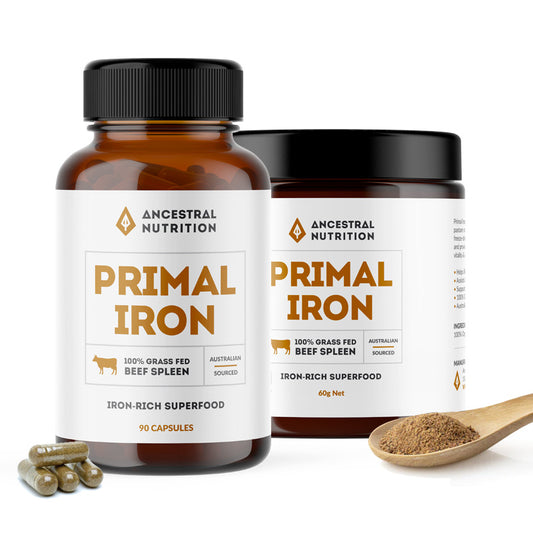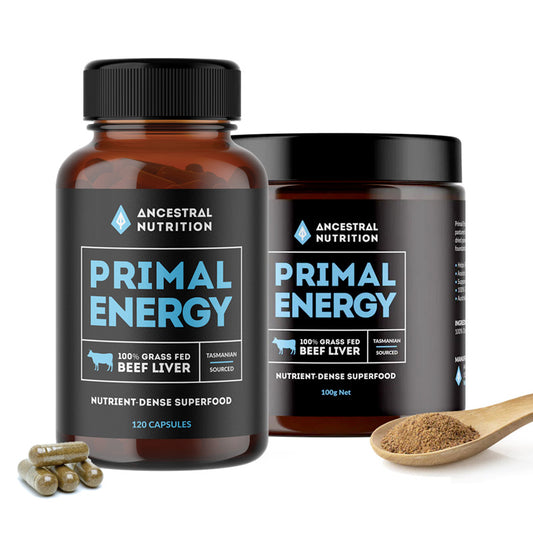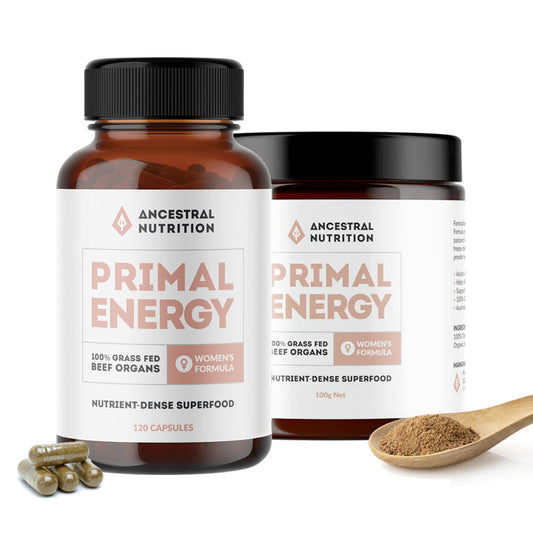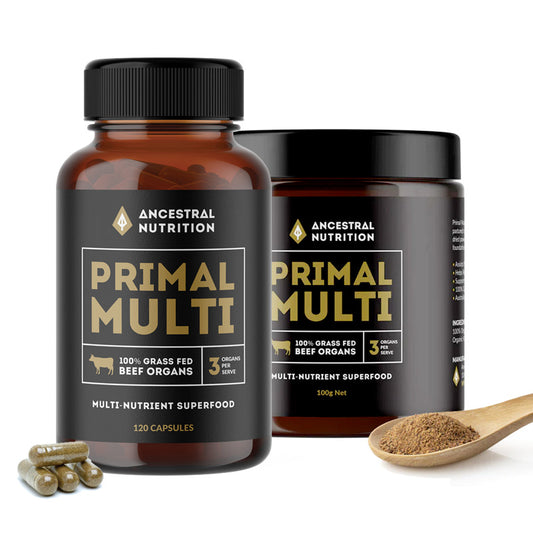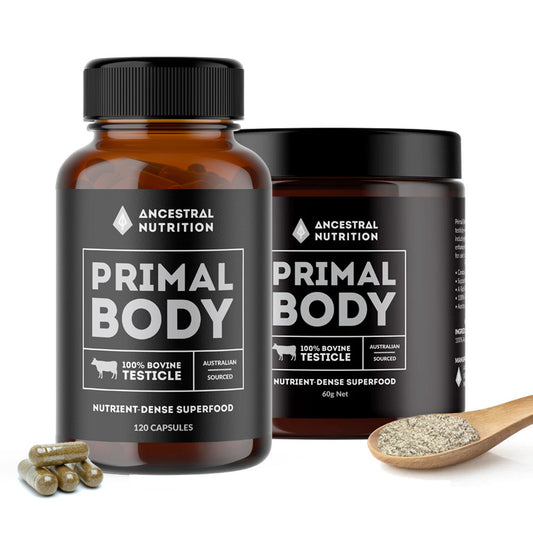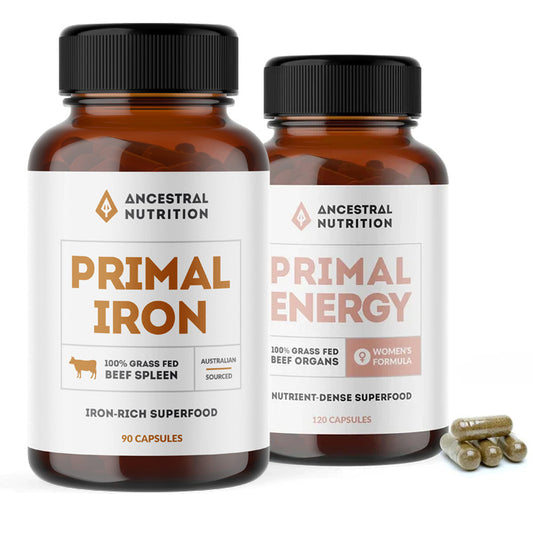Heme Iron Supplement For Energy Support And Everyday Vitality
article by Ancestral Nutrition

Iron is one of the most widely discussed nutrients among our community, and for good reason. It plays a central role in everyday wellbeing. Yet many people are confused about the best forms of iron and how to support their intake naturally. This article breaks down the differences between heme iron (from food sources like red meat and organs) and non-heme iron (found in plants and many supplements).
Understanding Iron in Food
Iron in the diet comes in two main forms:
- Heme Iron: Found in animal-based foods like beef, chicken, and liver. This form is typically absorbed more easily by the body.
-
Non-Heme Iron: Found in plants such as spinach, lentils, and grains. This form has more variable absorption and is influenced by other nutrients (like vitamin C).
Both types contribute to overall iron intake, and including a variety of sources is key.
Digestive Tolerance and Iron
Some people report digestive changes when taking iron supplements. These can include changes in bowel habits or general stomach upset, depending on the form and dose used.
In contrast, iron from wholefood sources like red meat or organ meats tends to be gentler on digestion for some individuals, as it’s consumed as part of a complete meal and often alongside supportive nutrients.
Where Is Heme Iron Found?
Many animal-based foods contain heme iron, including:
- Red Meat: Beef and lamb are well-known for their iron content.
- Poultry: Chicken and turkey offer a moderate amount.
- Fish: Tuna, sardines and salmon are common sources.
-
Beef Spleen: One of the most concentrated food sources of naturally occurring iron among organ meats.
Why Organ Meats?
Organ meats are among the most nutrient-rich foods available. Alongside heme iron, they naturally contain a range of nutrients like vitamin A, B12, copper, and folate—nutrients that work together in the body’s iron metabolism.
Our Wholefood Approach
At Ancestral Nutrition, we believe that food-based nutrients matter. That’s why we created Primal Iron, our premium grass-fed beef spleen product.
- Freeze-dried to retain natural nutrients
- 100% grass-fed and grass-finished
- No added hormones, antibiotics, or synthetic fillers
Available in capsule or powder form, Primal Iron is a simple addition to your daily routine for those looking to support their nutrient intake through real food.
Important Note: This content is for educational purposes only and is not intended to diagnose, treat, cure or prevent any health condition. Please speak with your health professional before starting any new supplement routine.
You can find out more about Primal Iron here
A heme iron supplement sits atop the shopping list for those seeking natural energy boosters.
Staring down a hectic day with little relief in sight, the demand for a reliable source of iron, like a beef organ capsule, is essential. You want natural nutrition that’s effective and gentle on your system. Heme iron, sourced from animal tissues like beef organs, fills this role seamlessly. Unlike synthetic options, it offers an easily absorbed form, welcomed by those wary of upset digestion or effectiveness.
Practical wellness seekers often find themselves at a crossroads. Choosing natural over synthetic is crucial for those who seek proof behind natural claims. A heme iron supplement provides reassurance of the benefits without the fuss of fillers and artificially enhanced products.
Ancestral Nutrition understands this need.
Founded by Matt Blackham and Stuart Cooke, our company aligns with a tradition of quality and sustainability rooted in Tasmania’s lush landscapes. We offer nutrient-rich, real food iron supplement options, harnessing the powerful benefits only pure, responsibly sourced organ meats can deliver.
Heme iron is a naturally occurring, food-based form of iron.
Heme iron is found naturally in animal-based foods like seafood, meat, and supplements like liver and spleen capsules.
This form of iron is recognised for its high bioavailability, meaning your body can absorb it efficiently. Unlike synthetic iron sources, which can be harder for your body to process, heme iron is easily utilised.
A heme iron supplement offers a simple, food-first way to support iron intake. Because it comes from real, whole food, it’s delivered in a form the body already recognises and knows how to use. This makes it a practical option for those looking to support energy and iron levels without relying on heavily processed alternatives.
For people who value transparency and traditional nutrition principles, heme iron fits naturally into a wholefood approach to daily nourishment. Something like an iron supplement from animal sources provides iron in its most bioavailable form, supporting the body in a way that feels both effective and aligned with real-food simplicity.
Iron supports energy, oxygen transport and daily vitality.
Iron plays a key role in how your body uses oxygen. It helps move oxygen through the bloodstream so your cells can produce energy efficiently, which is why an organ iron supplement can be so effective.
When iron levels are adequate, many people notice steadier energy and better endurance. That’s because oxygen delivery supports both physical stamina and mental focus. On long, demanding days, this process matters.
And iron isn’t a stimulant or a quick fix, either. It simply supports the systems your body already relies on to keep you going.
During busy or physically demanding periods, some people consider heme iron supplement options to help maintain resilience. Work, family life, training and everyday responsibilities all draw on your energy reserves. Consistent iron intake can help those demands feel more manageable by supporting normal energy metabolism rather than pushing the body beyond its limits.
The form of iron you choose also matters.
Well-absorbed forms like whole foods or a natural beef spleen supplement are gentler on digestion and reduce the likelihood of common side effects like discomfort or constipation. This makes it easier to stay consistent, which is an important factor when supporting iron levels over time.
A carefully chosen heme iron supplement, like beef spleen and beef liver powder, can support energy, endurance and daily vitality in a way that works with your body, not against it. You want simple, effective support without unnecessary trade-offs.
Explore our natural supplement options.
Ancestral Nutrition takes a wholefood approach to iron support, focusing on nutrients as they occur naturally in real food.
Our food-based iron supplement range is built around transparency and simple sourcing. Primal Iron is made from 100% beef spleen, providing heme iron in its natural form. Rather than relying on isolated or synthetic iron, it delivers iron alongside the naturally occurring supporting nutrients found in whole foods. Essentially, it helps the body recognise, absorb and use iron effectively.
When it comes to getting iron for everyday nutritional support, quality nutrition and responsible sourcing go hand in hand. That’s why we make sure you can trust us when it comes to the quality of your supplements:
- All the beef organs we use are sourced from grass-fed, grass-finished Tasmanian cattle, with a clear focus on sustainability and nutritional integrity.
- Our wholefood iron supplement products are gently freeze-dried to preserve their nutrient profile, offering targeted, food-based nourishment that fits well within something like a keto diet and supplements approach, without unnecessary processing.
- Available in capsules or powder, they offer a practical way to include responsibly sourced, wholefood nutrients as part of everyday nutrition.
Ancestral Nutrition maintains full control over manufacturing and distribution, allowing for consistent quality and fair pricing. Products like our natural iron supplement for women are Certified Humane®, third-party tested and trusted by a growing community, with over 850 five-star reviews from more than 76,000 customers.
By removing middlemen and focusing on real food simplicity, we make heme iron supplement options accessible and reliable, whether you’re supporting energy levels, managing iron intake or looking for a food-first alternative to conventional iron supplements.
Frequently Asked Questions (FAQ)
Is a heme iron supplement better absorbed than standard iron tablets?
Heme iron supplements are better absorbed than standard iron tablets because they mimic the form of iron found in foods, which supports easier digestion. This makes it more tolerable and effective for some individuals, making it easier to get heme iron for energy.
Who should consider taking a heme iron supplement?
People who experience fatigue, low energy or increased nutritional demands may benefit from considering heme iron support.
It may also suit individuals seeking to support iron intake naturally using food-based options. Those who want their iron pills natural can always turn to our range of wholefood-derived supplements.
Are heme iron supplements made from real food sources?
An iron supplement made from beef from Ancestral Nutrition is made from real wholefood sources like 100% grass-fed beef organs. This wholefood approach provides iron in its natural form, along with complementary nutrients found in food. The supplements contain no artificial additives or synthetic fillers.
Elevate wellness with Primal Iron, nature’s true iron source.
Primal Iron, made of 100% beef spleen for energy support, delivers naturally occurring heme iron straight from a premier source.
Harnessing the benefits of heme iron found in animal tissue, Primal Iron offers superior absorption and gentler digestion compared to synthetic isolates, making it a great choice for those looking for an easily absorbed iron supplement. We maintain the utmost quality by partnering with Greenham, a reputable Australian business focusing on sustainable, grass-fed beef.
So, if you’re looking for a natural beef organ supplement Australia-wide, check out our range today!
Disclaimer: The information presented on this page is provided for general educational purposes only and is not intended to diagnose, treat, cure or prevent any disease.

